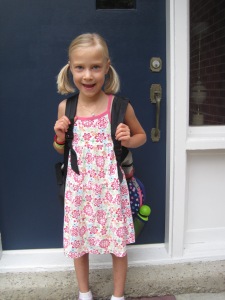With the revelation a year ago that our twin daughters have dyslexia, we joined the millions across the country who are parenting children with learning disabilities. We now know that our kids have special needs, and we must navigate the education system accordingly.

We were shocked to discover that our public school could not help us with dyslexia. They were not even aware of its signs.
For almost two years, we asked “Why are the girls having so much trouble learning to read? Why is this going so slowly and so painfully?” Neither their kindergarten nor their first grade teacher had answers. They told us to just keep working at home while they worked at school, and it would eventually click.
It never clicked. In first grade, the girls started seeing the school reading specialist several times a week. We asked her, too. All she could point to was their anxiety about reading.
Finally, I grew suspicious and googled symptoms of dyslexia. The girls were textbook cases. An outside evaluation later confirmed this. Why had the teachers at school not seen this? As I talked with them about it, I learned that they had not been trained to spot dyslexia. Not even the reading specialist.
How could this be? Research indicates that up to 15% of the population may be dyslexic, and yet public school teachers have not been trained to spot the signs? Even if only 5% of schoolchildren are dyslexic, that still adds up to 2.5 million children this year.
Let me be clear – I do not blame my daughters’ teachers. They cared about my kids and wanted them to succeed. After I discovered the girls’ dyslexia, they were eager to talk with me and learn more.
No, the fault lies higher up.
Our second shock came when we discovered that even with dyslexia diagnoses in hand, the school was unwilling to remediate it with research-proven methods. They were not even willing to use the word dyslexia—the one word that unlocks the whole mystery.
The school’s own tests confirmed what our private ones had—while skilled in listening comprehension and vocabulary, the girls had a specific learning disability relating to phonological awareness and phonemic processing. (That is the technical way of describing dyslexia.)
Yet, the administration insisted they could not speak in terms of “dyslexia.” And their plan was to keep trying what they had already been doing to help the girls learn. We officially qualified for services, but it seemed the services were just going to be more frequent use of the same methods they had already been using. They were not going to apply any of the findings on how to teach dyslexic children to read, proceeding as though decades of research had never occurred.
A (tragic) irony is that our school is less than two miles from one of the universities where much of this research is being done. Regarding my kids’ education plans, we had to ask: what good are services if they are not well directed?
Dyslexia is no longer the mystery it once was. Extensive research has shown repeatedly that the way you teach dyslexics to read is through “explicit, systematic teaching on connections between the sounds and syllables in words and the letter combinations that represent those sounds and syllables.” Our own experience has since proven this. The girls have been tutored with this approach for the last eight months, and their progress is clear and measurable.
When we discovered that our school was not planning to do what would truly help, we were heartbroken. All we wanted was for our daughters to thrive at the school a block from our house…and learn to read. Instead, our school was enumerating our kids’ failures (measured by mandatory state testing) on every report card but was unwilling to employ the teaching methods that would turn those failures to successes. This, despite the fact that my district is known to be one of the best in the state. And I believe it is good in many ways, but we learned the hard way that serving dyslexic students is not one of them.
Lest you think that my district is particularly bad on this issue, I need to mention that my reading indicates that many, many districts in many, many states are similarly unhelpful. It may even be the majority.
Why precisely this is, I cannot say. Where does the fault lie? Is it the principals? The district administrators? The teachers unions? Common core? Our country’s education schools? It is difficult to know who is responsible for this widespread failure.
And it is indeed a failure. Research indicates that up to 80% of all struggling readers have some form of dyslexia. This means that properly identifying and remediating it is as close to a silver bullet as we’re ever going to find to raise our national test scores and to narrow the achievement gap. Dyslexic students are the largest body of learning disabled students in the country. We cannot have an effective education system without properly serving them.
As for our family, we were faced with a very painful choice. Stay at our beloved public school or move the girls to a school that was willing to acknowledge dyslexia as a category and serve them accordingly? I shed buckets of tears in making this decision (and the girls shed more buckets after we made it). As I’ve enumerated elsewhere, we love having our kids attend the public school around the block. As disappointed as I am with how they’ve handled my daughters’ reading struggles, I still cherish our relationships there and the many blessings the school and its teachers have afforded us. I still believe in public education. I can see how hard our school is working to serve a socio-economically diverse study body—a very complex task.
We were able to find a private school nearby that uses a reading curriculum that works particularly well for the dyslexic brain, and whose smaller size would serve our kids well. (Side note: there are a handful of great curriculums that can simultaneously serve students with dyslexia and those without. They are even likely to teach spelling better to non-dyslexics. Sadly, our public district has chosen a different kind of curriculum.)
The girls started at their new school last September, and they love it. They are thriving with the new curriculum, just as the research suggested they would. We hold out hope that they will be able to return to our public school after their reading is secure, but we plan to make that decision year by year.

My parents’ generosity made this school change possible. Because my children had grandparents who had the means to pay for a private school, they can learn to read alongside their peers. What about those without such resources? What about the millions of dyslexic kids whose only choice is the public school?
This question keeps me up at night. I am deeply troubled as I contemplate all the dyslexic children who are being ill served by their public schools, some of whom I have watched with my own eyes. Part of the answer, of course, is to advocate for the education establishment to abandon its blindness regarding dyslexia, and I intend to join the many who are already doing this. I’m not sure this is the whole answer, though.
Perhaps I also need to advocate for all parents to have educational options for their children like I had, especially those without financial resources. How else to get this besides school choice?
I recognize that school choice policies need to be very carefully examined and implemented, looking closely to the needs of families without independent transportation and those whose special needs make them dependent on well-funded public education. Millions of children with other learning disabilities have been well served in our public schools, and those services need to be vigorously guarded.
Please hear my nuance here. I simultaneously implore the public education system to do better regarding dyslexia even as I recognize its indispensability to many of the most vulnerable in our country. I share concerns about whether Betsy DeVos is the right person to skillfully implement school choice, but that does not negate my belief in school choice itself. I agree that the way school choice is currently being implemented needs reform.
I desire a robust public school system that is complemented by an array of alternative school choices. One size does not have to fit all. New creativity and wisdom are needed as we seek to help every child flourish.
My kids are now thriving. They have acquired the foundational skills necessary for reading. I am delighted by their progress; I only wish it could have occurred in our public school. My heart is still there even though two of my kids are not.
©Laura Goetsch and Thinking About Such Things, 2017.

Laura! Very well written, as always. What came to my mind is my shock at your schools not being even conversant on the subject of dyslexia, and here they sit in the middle of one of the most highly regarded universities in the country!! Do you have any inclination to talk to the education department about this? Is there any possibility of generating a link between that college’s Dept of Educ., and the state school association [if it doesn’t already exist]? There are other conditions such as auditory processing disorder, and “spectrum” disorders that affect a number of kids in the schools – do the public schools provide fundamental support for them? When you think about the aggregate of kids with dyslexia, auditory process disorder, and other “spectrum disorders” , it may account for a substantial number of kids in public schools who require specific ed. services, and broader curriculum styles to meet the needs of these kids. No longer should we accept the one-size-fits-all … To be investigated: what is the curriculum for a degree in education/+ teaching certificates — is it only directed to the 50% of average learners???
LikeLike
Yes, it is shocking. And, sadly, my impression is that what is going on here is not plain ignorance but, rather, willful ignorance. You don’t have to fix a problem you don’t name, after all.
I’m not sure what is going on in the Ed School, other than I’ve heard that the teaching on special education for those going into general education is very, very limited. The independent experts in town (who are affiliated with a different part of the University) are trying to do all they can to remedy the situation — present in the Ed school when invited, attend IEP meetings when invited, present in local elementary schools when invited, give individual families the coaching they need to navigate the system, network, network, network. My understanding, though, is that they have found a general resistance to all-things-dyslexia from much of the education establishment. And yes, this does cast doubt on whether our education establishment is currently able to do more than reach the 50% who are traditional learners.
PS – I have slightly edited your comment to remove the name of my town and its university. I try to not explicitly name my location online for security purposes.
LikeLike
Pingback: On reacting and writing slowly – Thinking about such things
Pingback: Sewing My Net (or Why I’ll Probably Never Have a Mudroom) – Thinking about such things